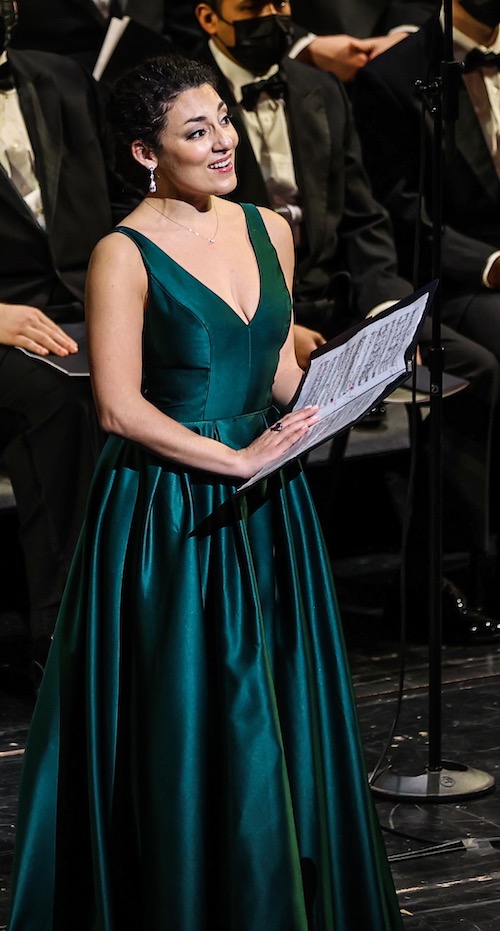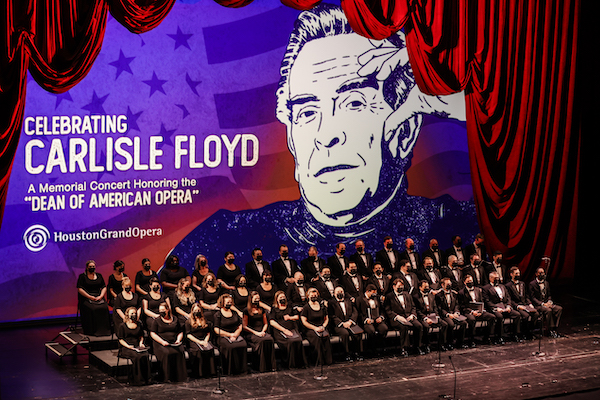Houston Grand Opera fetes Carlisle Floyd as composer, mentor and friend

Carlisle Floyd was a young faculty member at Florida State University when his Susannah made him an operatic sensation in the mid-1950s.
His move to the University of Houston in 1976 brought him the bonus of a new creative home: Houston Grand Opera, which staged a decades-long series of Floyd premieres and revivals, right up to the unveiling of his last opera, Prince of Players, in 2016.
HGO looked back across his career on Friday with “Celebrating Carlisle Floyd”—a memorial concert to the company’s longtime ally, who died last September 30 at age 95.
Through excerpts from Floyd’s operas and reminiscences by people who knew him, the program at Wortham Theater Center created a portrait of Floyd the composer—a champion of traditional melody, harmony and such when they were out of fashion.
The evening also heralded Floyd as a mentor. His influence on the opera world extended to his helping found and lead the HGO Studio training program, whose alumni include soprano Ana Maria Martinez; mezzo-sopranos Joyce DiDonato, Denyce Graves and Jamie Barton; and many other notables.
The concert’s only non-Floyd music was the opening work, the Overture from Engelbert Humperdinck’s Hansel and Gretel. The guardian angels who appear in Hansel, HGO artistic director Patrick Summers explained, harkened back to Floyd’s role as guardian and guide to the company. Played with warmth and lustiness by the HGO Orchestra, led by Summers, the overture accompanied a photo montage of Floyd across the years—in settings ranging from bustling rehearsal studios to the White House, where he received the National Medal for the Arts in 2004.
Floyd’s artistic spirit finally came into focus when soprano Andrea Carroll—HGO Studio alumna and Pamina in HGO’s current staging of The Magic Flute—strode onstage and launched into “Ain’t it a pretty night!” from Susannah.
From the sweetness she gave the aria’s opening to the richness and fervor she lavished on Susannah’s vision of the big-city world beyond the mountains, Carroll captured not only the allure of Floyd’s lyricism but the innocence and goodness of Susannah herself—the naive country girl who is eventually destroyed by a lascivious preacher. The ampleness and dark shadings lof Carroll’s soprano lent Susannah’s musings a larger-than-life impact.
The conflict between decency and hypocrisy, the driving force of Susannah, was a recurring theme for Floyd. He returned to it in Cold Sassy Tree, the tale of a small-town shopkeeper whose neighbors are scandalized when he marries a much younger woman soon after his first wife’s death. HGO premiered the comedy-drama in 2000, and Friday’s concert brought back the climax of the opera’s first act—when protagonist Rucker Lattimore, disgusted by the local busybodies’ gossip, summons his grandson and new wife to his home and holds his own church service.
The scene centers on Rucker’s impromptu sermon—first a dig at misguided religious zeal, then a panegyric to the beauty God surrounded us with on earth—and bass Raymond Aceto delivered it with unbridled gusto. His deep, booming tones not only put over the passion of Rucker’s love of beauty and life, but the glee Rucker takes in thumbing his nose at his stuffed-shirt neighbors.
In their banter with Aceto’s Rucker, soprano Caitlyn Lynch and tenor Norman Reinhardt—respectively Love Simpson, Rucker’s new wife, and Will Tweedy, his grandson—sang with a zest that complemented Aceto’s. And a phalanx of singers mostly from the HGO Studio tut-tutted vigorously as the busybodies.

Soprano Patricia Racette, who played Love Simpson in the premiere, contributed a video tribute offering a glimpse of Floyd at work. During a Cold Sassy Tree rehearsal, she recalled, he came up to her after a vocally taxing scene and asked, “That’s a bit punishing, isn’t it?” When she said it indeed was, Floyd “made adjustments” to reduce the pressure.
“He knew how to extract the best from any participants,” Racette said. As an example of Floyd doing so, HGO’s longtime chorus master, Richard Bado, recalled being tapped to take over for another conductor in an HGO production of Susannah. He was uncertain, but Floyd encouraged him, promising to guide Bado through. And so he did, not only sitting nearby at rehearsals to offer tips, but going through the score with Bado at his kitchen table.
Bado and the HGO Chorus returned the favor with a chorus from Floyd’s The Passion of Jonathan Wade, a drama set in the aftermath of the Civil War. In “It is done: the war is over and we who are left endure,” the regretful populace laments the destruction wrought by their recklessness. Bringing the words better enunciation than some soloists display, the chorus made the opening’s quiet ruefulness as telling as the climax’s fierce regret.
Floyd had a penchant for setting literary classics, and HGO’s tribute turned to his best-known example: Of Mice and Men. Tenor Richard Trey Smagur—HGO studio alumnus and the forceful Don Jose in HGO’s Carmen last fall LINK—joined current Studio baritone Luke Sutliff in the Depression-era tragedy’s final scene.
The scene focuses on the doomed Lennie, who has unwittingly killed a woman, and Smagur’s commitment and intensity brought Lennie’s plight to life in moments. Smagur’s big, burly voice symbolized not only Lennie’s physical strength, but the power of the fear inside him; at the other extreme, Smagur sang at times in a half-voice that made Lennie’s lament of “I feel cold inside” almost physically tangible.
As George distracted Lennie by invoking their dreams of a farm, Sutliff sang ably. But Smagur’s vocal heft galvanized attention again as Lennie was swept up in the illusion, crying out, “I can see it!” The climactic gunshot was omitted.
After former HGO executive director David Gockley came onstage to offer his own view of his longtime collaborator and friend, a video clip from the Gockley era—a 1981 telecast of Floyd’s Willie Stark, based on Robert Penn Warren’s All the King’s Men—showed baritone Timothy Nolen throwing himself into the role of the demagogue Willie with almost maniacal energy.
Turning to something altogether more innocent, tenor Reinhardt and soprano Raven McMillon offered a scene from Cold Sassy Tree. In the “Guardian Angel” duet for young Will Tweedy and his soon-to-be-sweetheart Lightfoot McLendon, the two sang with a freshness that suited the blossoming of first love.
Soprano Lynch, filling in after Martinez bowed out, closed the program by returning to Susannah—now with the folksong-like “The trees on the mountains.”
Where Carroll’s voice had been rich and dusky, Lynch’s was brighter, bringing the betrayed Susannah’s fragility all the more to the forefront. When the orchestra’s strings created a gentle mist of sound, Lynch’s shimmering tones complemented them. And as her voice finally floated to the heights in a whisper, Lynch created the kind of magic that must have been Floyd’s lodestar.
Houston Grand Opera’s production of Mozart’s The Magic Flute closes this weekend. The company presents Puccini’s Turandot at Wortham Theater Center April 22-May 6. houstongrandopera.org; 713-228-6737.